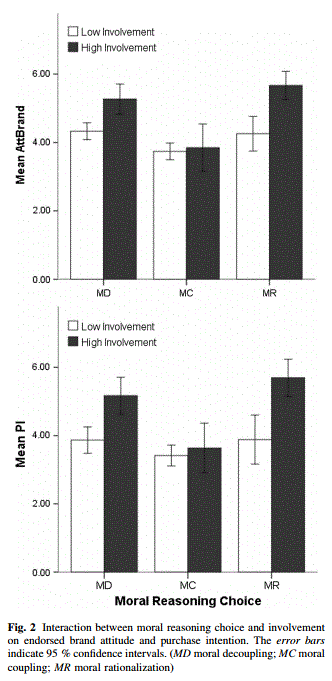The researchers conducted three experiments:
- In the first study, participants read a series of three statements intended to prime different moral reasoning strategies (moral coupling, moral decoupling, and moral rationalization). For example, in the moral decoupling condition participants read three statements suggesting that immoral actions should remain separate from judgments of performance. They were then read a brief scenario describing a successful track-and-fielder who was convicted of tax evasion. Afterwards participants completed questionnaires assessing their perceptions of the athlete's performance and immorality.
- In the second study, the researchers sought to examine the effect of transgression type (performance related vs. performance unrelated) on participants' choice of moral reasoning strategy. Participants were then read one of three scenarios: one in which a successful track-and-fielder admitted to engaging in doping, one in which the athlete admitted to engaging in financial fraud, or one describing the athlete’s hobbies.
- The third study examined the impact of moral reasoning choice on evaluations of transgressors and their endorsed brands.
Lee and Kwak found that:
- Moral reasoning priming affected evaluations of both performance and immorality. Participants in the moral coupling condition rated the athlete's performance lower than participants in the moral decoupling, moral rationalization, or control conditions. Respondents in both the moral coupling condition and moral decoupling condition reported the athlete to be more immoral than respondents in the moral rationalization and control conditions.
- "The choice of a moral reasoning strategy depended on the performance relevance of the transgression. Consistent with our expectation, [participants] found it more difficult to decouple or rationalize when the transgression was performance-related (doping). On the other hand, the majority of participants (65 %) chose a moral decoupling strategy when an athlete admitted to financial fraud."
- "Participants' support for (or opposition toward) a brand endorsed by a transgressor is a direct function of moral reasoning choice. Findings suggest that public figure’s immoral behavior and its spillover to an extended brand is contingent on consumers' moral reasoning choices."
The authors conclude that
"the findings of this study suggest that consumers' moral reasoning strategy is critical in understanding how consumers process a public figure's immoral behavior. Consumers' evaluations of the transgressor and the associated brand are a direct function of their moral reasoning choices. From a practical point of view, we show that transgression type and personal involvement with the domain further relate to consumers' moral reasoning process and their intentions to support the endorsed brand."
Read more:
https://record.umich.edu/articles/some-think-cheating-field-worse-cheating-spouse
http://download.springer.com/static/pdf/877/art%253A10.1007%252Fs10551-015-2544-1.pdf?auth66=1422467442_e59f2105ecbfb85c5a992b5c38bed6e6&ext=.pdf







No comments :
Post a Comment